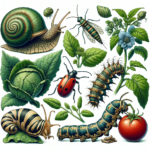Understanding Organic Pesticides
When it comes to cultivating a thriving garden, pest management is a crucial aspect that requires careful consideration. Understanding organic pesticides can be the key to maintaining a healthy garden ecosystem while minimizing harm to the environment.
The Essence of Organic Pesticides
Organic pesticides are derived from natural sources and are designed to control pests while preserving the ecological balance of the garden. Unlike synthetic pesticides, organic alternatives are biodegradable and pose less risk to beneficial insects, animals, and the overall environment.
Benefits of Using Organic Pesticides
- Environmental Safety: Organic pesticides are less harmful to the environment, reducing the risk of soil and water contamination.
- Biodiversity Preservation: By targeting specific pests, organic pesticides help maintain the delicate balance of the garden ecosystem.
- Healthier Produce: Organic pesticides promote the growth of healthier fruits and vegetables free from harmful chemical residues.
Common Organic Pesticides
There are several organic pesticides that are widely used in garden management:
| Pesticide | Source | Target Pests |
|---|---|---|
| Neem Oil | Neem tree seeds | Aphids, mites, caterpillars |
| Diatomaceous Earth | Fossilized remains of diatoms | Ants, beetles, slugs |
| Pyrethrum | Chrysanthemum flowers | Beetles, aphids, moths |
Application of Organic Pesticides
When using organic pesticides, it is important to follow these guidelines:
- Identify the Pest: Properly identify the pest to choose the right organic pesticide for effective control.
- Timing: Apply the pesticide during the optimal time for maximum impact on the target pests.
- Follow Instructions: Always read and follow the instructions on the pesticide label to ensure safety and efficacy.
Definition and Benefits
When it comes to organic pesticides, understanding their definition and the benefits they offer is crucial for any gardener. Let’s delve into the essence of organic pesticides and how they can positively impact your garden.
Defining Organic Pesticides
Organic pesticides are derived from natural sources, such as plants, minerals, or bacteria, and are used to control pests that may harm crops without the use of synthetic chemicals. These pesticides are environmentally friendly and promote sustainable gardening practices.
Benefits of Organic Pesticides
- Safe for Beneficial Insects: Unlike chemical pesticides, organic pesticides target specific pests while preserving beneficial insects like bees and ladybugs.
- Biodegradable: Organic pesticides break down naturally, reducing their impact on the environment and preventing chemical buildup in soil and water.
- Healthier Produce: By using organic pesticides, you can ensure that your fruits and vegetables are free from harmful chemical residues, promoting healthier produce.
- Sustainable Practices: Incorporating organic pesticides into your gardening routine supports sustainable agriculture and helps maintain the ecological balance of your garden.
Embracing organic pesticides not only safeguards your garden but also contributes to a greener and more sustainable environment for future generations.
How Organic Pesticides Differ from Synthetic Pesticides
When comparing organic pesticides to their synthetic counterparts, several key differences emerge. Understanding these distinctions can help you make informed decisions about pest management in your garden.
1. Chemical Composition
Organic pesticides: Derived from natural sources such as plants, minerals, or bacteria. They often contain compounds like pyrethrin or neem oil.
Synthetic pesticides: Formulated with man-made chemicals and substances that may not occur naturally. These can include glyphosate or chlorpyrifos.
2. Mode of Action
Organic pesticides: Typically target pests with specific modes of action, impacting certain biological processes to control populations.
Synthetic pesticides: Often designed to have broad-spectrum effects, affecting a wide range of pests but potentially harming beneficial insects as well.
3. Environmental Impact
Organic pesticides: Tend to break down more rapidly in the environment, reducing the risk of long-term pollution or harm to non-target organisms.
Synthetic pesticides: May persist in the environment for longer periods, leading to concerns about bioaccumulation and ecosystem disruption.
4. Residue Levels
Organic pesticides: Often leave lower residue levels on produce, promoting safer consumption and reducing potential health risks.
Synthetic pesticides: Can leave higher residue levels on crops, raising questions about the impact on human health and the environment.
By recognizing these differences, gardeners can weigh the trade-offs between using organic pesticides, which offer a more natural approach, and synthetic pesticides, which may provide stronger immediate control but come with potential drawbacks.
Environmental Impact
When it comes to using pesticides in your garden, it is crucial to consider their environmental impact. Here are some key points to keep in mind:
1. Eco-Friendly Options
- Organic pesticides: Opt for organic pesticides that are derived from natural sources and are less harmful to the environment.
- Biodegradable formulas: Choose pesticides that break down easily without leaving harmful residues in the soil or water.
2. Impact on Pollinators
Pesticides can have detrimental effects on pollinators such as bees and butterflies. It is essential to select pesticides that target specific pests without harming beneficial insects.
3. Soil Health
Some pesticides can negatively impact soil health by killing essential microorganisms. Look for products that maintain a balance in the soil ecosystem.
4. Water Contamination
“Pesticides may leach into the ground and contaminate groundwater sources, posing risks to human health and aquatic life.”
5. Biodiversity Preservation
Choose pesticides that preserve biodiversity by targeting specific pests and preventing the disruption of the ecosystem balance in your garden.
6. Sustainable Practices
Implement sustainable gardening practices along with the use of pesticides to minimize environmental impact and promote long-term ecological balance.
Popular Types of Organic Pesticides
Natural Oils
Natural oils such as neem, sesame, and horticultural oils are effective organic pesticides that control a wide range of insects like aphids, mites, and caterpillars. They suffocate or disrupt pests’ life cycles without harming beneficial insects.
Botanical Pesticides
Derived from plants like pyrethrum, rotenone, and sabadilla, botanical pesticides are broad-spectrum and target a variety of pests including beetles, caterpillars, and mites. They are biodegradable and pose minimal risk to the environment.
Microbial Insecticides
Contain living microorganisms such as bacteria, fungi, or viruses that infect and kill specific pests like caterpillars, grubs, or larvae. Microbial insecticides like Bacillus thuringiensis (Bt) are safe for humans and animals while effectively controlling pests.
Insecticidal Soaps
Gentle on most plants, insecticidal soaps are made from potassium salts of fatty acids that disrupt the cell membranes of insects like aphids, mealybugs, and spider mites. They are non-toxic to humans, birds, and other wildlife.
Homemade Remedies
Garlic, hot pepper, and onion sprays are simple yet effective organic pesticides that can be easily made at home. These natural deterrents repel pests like aphids, beetles, and caterpillars, keeping gardens safe without harmful chemicals.
Neem Oil
Neem oil, derived from the seeds of the neem tree, Azadirachta indica, has been used for centuries in organic gardening for its plethora of benefits. Let’s explore the wonders of neem oil and how it can enhance your gardening experience.
Benefits of Neem Oil in Garden Pest Control
Neem oil serves as a powerful natural pesticide, offering a variety of advantages:
- Pest Repellent: Neem oil disrupts the feeding and reproductive patterns of pests, deterring them from infesting your plants.
- Insect Growth Regulator: It inhibits the growth and development of insect larvae, effectively reducing their population.
- Fungicidal Properties: Neem oil combats fungal diseases by preventing spore production and growth.
Application and Usage Tips
When using neem oil in your garden, consider these tips for optimal results:
- Dilution: Always dilute neem oil as per the instructions to avoid any phytotoxic effects on your plants.
- Timing: Apply neem oil early in the morning or late in the afternoon to prevent harm to beneficial insects.
- Frequency: Repeat applications every 7-14 days, especially during peak pest seasons.
Cautionary Notes
While neem oil is a safe and natural alternative to synthetic pesticides, it is essential to be mindful of the following:
Always perform a patch test on a small area of your plants before widespread application to ensure compatibility.
Remember, a collaborative effort between nature and your gardening practices can yield the most fruitful results.
Diatomaceous Earth
Diatomaceous earth is a versatile and effective organic pesticide that can be a valuable addition to your gardening toolkit. In this section, we will explore the benefits and uses of diatomaceous earth in garden pest control.
What is Diatomaceous Earth?
Diatomaceous earth is a naturally occurring sedimentary rock that is crumbled into a fine powder. It is composed of the fossilized remains of diatoms, a type of hard-shelled algae. This powder is abrasive to insects and pests, making it an excellent natural pesticide.
Benefits of Diatomaceous Earth
- Non-toxic: Diatomaceous earth is safe to use around children, pets, and beneficial insects.
- Effective: It works by dehydrating insects and pests, ultimately leading to their demise.
- Versatile: Can be used indoors and outdoors to control a variety of pests such as ants, bed bugs, and fleas.
- Long-lasting: Once applied, diatomaceous earth remains effective as long as it is kept dry.
Using Diatomaceous Earth in Your Garden
To effectively use diatomaceous earth in your garden, follow these tips:
- Apply a thin layer: Sprinkle a fine layer of diatomaceous earth around plants and areas where pests are present.
- Reapply after rain: If it rains, reapply the powder as it loses its effectiveness when wet.
- Wear a mask: When applying diatomaceous earth, wear a mask to avoid inhaling the powder.
Quotes
“Diatomaceous earth has been a game-changer in my organic gardening routine. It’s effective and safe, giving me peace of mind while tending to my plants.”
Garlic Spray
Garlic spray is a natural and effective way to protect your garden from pests without harmful chemicals. Learn how to make your own garlic spray and keep your plants healthy.
Benefits of Garlic Spray
- Acts as a repellent against common garden pests such as aphids, caterpillars, and beetles.
- Safe for the environment, beneficial insects, and pets.
- Cost-effective solution compared to commercial pesticides.
How to Make Garlic Spray
Making your own garlic spray is simple and requires just a few ingredients:
- Ingredients:
- Garlic cloves
- Water
- Liquid dish soap
- Instructions:
- Crush several garlic cloves and let them sit in water overnight.
- Strain the garlic and mix the infused water with a few drops of liquid dish soap.
- Transfer the mixture to a spray bottle and apply to your plants.
Tips for Using Garlic Spray
“To ensure the effectiveness of garlic spray, apply it to your plants in the early morning or late afternoon to prevent leaf burn from the sun.”
Remember to test the spray on a small area of your plants before applying it extensively to ensure there are no adverse effects.
Pyrethrin
Pyrethrin is a versatile and popular organic pesticide derived from chrysanthemum flowers. Its effectiveness in controlling a wide range of garden pests makes it a valuable tool for gardeners seeking natural solutions.
Benefits of Pyrethrin:
- Fast-acting: Pyrethrin quickly incapacitates pests upon contact, providing rapid results.
- Low Persistence: It breaks down rapidly in sunlight, leaving minimal residue and reducing environmental impact.
- Broad Spectrum: Effective against a variety of insects including aphids, beetles, caterpillars, and more.
- Organic Certification: Being naturally derived, pyrethrin is approved for organic gardening practices.
Application Tips:
When using pyrethrin in your garden, ensure to follow these guidelines:
- Dilution: Always dilute pyrethrin concentrate according to the instructions to avoid harming beneficial insects.
- Timing: Apply early in the morning or late in the evening when beneficial insects are less active.
- Frequency: Reapply as needed, especially after heavy rain, to maintain pest control effectiveness.
Precautions:
While pyrethrin is considered relatively safe for humans and animals, it’s essential to take the following precautions:
- Protective Gear: Wear gloves, long sleeves, and a mask when handling concentrated pyrethrin.
- Avoid Contamination: Prevent run-off into water sources and keep away from aquatic environments.
Environmental Impact:
Pyrethrin’s low toxicity to mammals and birds makes it a preferred choice for environmentally conscious gardeners. However, it’s crucial to use it responsibly to minimize any adverse effects on non-target species.
Soap-based Sprays
The Power of Soap-based Sprays in Garden Pest Control
Soap-based sprays are a trusted and environmentally friendly way to combat pests in your garden. Their gentle yet effective nature makes them a popular choice for many gardeners.
How Soap-based Sprays Work
These sprays work by disrupting the cell membranes of insects, leading to dehydration and ultimately, their demise. It is a natural and non-toxic method of pest control.
Advantages of Soap-based Sprays
- Gentle on Plants: Unlike chemical pesticides, soap-based sprays are gentle on plants, minimizing the risk of damage.
- Safe for Beneficial Insects: These sprays are targeted towards pests, leaving beneficial insects unharmed.
- Environmentally Friendly: They decompose naturally and do not leave harmful residues in the soil.
How to Use Soap-based Sprays
- Mixing: Follow the instructions for diluting the soap concentrate with water.
- Application: Spray the solution on the affected plants, ensuring full coverage of both upper and lower leaf surfaces.
- Timing: Apply the spray in the early morning or late afternoon to prevent leaf burn in intense sunlight.
Effectiveness and Considerations
While effective against soft-bodied insects like aphids and mites, soap-based sprays may not work as well on hard-shelled pests. Regular monitoring and reapplication may be necessary.
Quotes to Remember
“Using soap-based sprays in my garden has not only controlled pests effectively but also kept my plants healthy without harmful chemicals.” – Garden Enthusiast
Making Your Own Organic Pesticides
Creating your own organic pesticides can be a rewarding and effective way to protect your garden from pests without harmful chemicals. Below are some tips to help you make and use these natural solutions:
1. Essential Oils
Essential oils such as neem oil and peppermint oil can act as natural insect repellents. Mix a few drops of your chosen oil with water and a small amount of mild soap in a spray bottle. This mixture can help deter pests like aphids and beetles.
2. Garlic and Chili Spray
Create a potent pesticide by blending garlic cloves and hot chili peppers with water. Let the mixture sit overnight, then strain it and spray it on plants to repel insects. Remember to wear gloves and avoid contact with your eyes when handling this solution.
3. Soap Spray
A simple mixture of water and liquid soap can help control soft-bodied insects like mites and aphids. Spray this solution directly on the pests, ensuring thorough coverage. Repeat every few days as needed.
4. Diatomaceous Earth
Diatomaceous earth is a natural powder that can be sprinkled around plants to control pests like slugs, snails, and other crawling insects. This substance works by dehydrating and damaging the outer shells of pests.
Remember, while these organic pesticides are safer for the environment and beneficial insects, it’s essential to test them on a small area of your plants before widespread use to ensure compatibility.
DIY Recipes Using Common Household Ingredients
Introduction
Creating your own organic pesticides using common household ingredients can be both rewarding for your garden and eco-friendly. Here are some simple and effective DIY recipes you can try.
Vinegar-Based Pesticide
A vinegar-based pesticide is a versatile solution that can help control various garden pests.
- Mix 1 part vinegar with 3 parts water in a spray bottle.
- Add a few drops of liquid dish soap to help the solution stick to plants.
- Apply directly to affected plants, focusing on the undersides of leaves where pests hide.
Garlic and Pepper Spray
This natural pesticide acts as a repellent for many insects while being safe for plants.
- Blend 3-4 cloves of garlic and 1-2 hot peppers with 2 cups of water.
- Let the mixture sit for 24 hours.
- Strain the liquid and add a few drops of dish soap.
- Spray on plants, ensuring even coverage.
Neem Oil Solution
Neem oil is a powerful natural insecticide and fungicide with a long history of use in gardening.
“Neem oil disrupts the feeding and reproductive patterns of many insects, making it an effective and low-toxicity choice for pest control.”
- Mix 2 teaspoons of neem oil with 1 teaspoon of liquid soap in a quart of water.
- Shake well and spray on affected plants, avoiding blooms to protect pollinators.
Baking Soda Fungicide
Combat fungal diseases with this simple baking soda solution.
- Combine 1 tablespoon of baking soda, 1 teaspoon of vegetable oil, and 1 teaspoon of dish soap in a gallon of water.
- Stir well and spray on plants affected by fungal issues.
Safety Considerations
Ensuring the safety of both yourself and the environment is paramount when using organic pesticides in your garden. Here are some key considerations to keep in mind:
Educate Yourself
- Read the Labels: Always carefully read and follow the instructions on the pesticide label. Pay close attention to dosage, application methods, and safety precautions.
- Understand the Product: Take the time to understand how the pesticide works, its potential hazards, and the specific pests it targets.
Protective Gear
Wearing the appropriate protective gear can safeguard you from any potential risks associated with handling organic pesticides.
- Gloves: Wear chemical-resistant gloves to protect your skin from direct contact with the pesticide.
- Mask: Use a mask to prevent inhaling any pesticide fumes or particles during application.
- Clothing: Wear long sleeves, pants, and closed-toe shoes to minimize skin exposure.
Application Tips
“Proper application is key to the effectiveness of organic pesticides.”
- Timing: Apply pesticides when the target pests are most active for optimal results.
- Weather Conditions: Avoid applying pesticides on windy days to prevent drift and on rainy days to ensure the product isn’t washed away.
- Storage: Store pesticides in their original containers in a secure location away from children and pets.
Environmental Impact
Minimizing the environmental impact of pesticides is essential for maintaining a healthy garden ecosystem.
- Targeted Application: Apply pesticides directly to affected areas rather than blanket spraying to reduce unintended exposure.
- Natural Predators: Encourage natural predators in your garden to help control pest populations naturally.
Best Practices for Using Organic Pesticides
When it comes to safeguarding your garden from pests while maintaining an environmentally friendly approach, utilizing organic pesticides is a prudent choice. To ensure optimal efficacy and safety, follow these best practices:
1. Read and Follow Instructions Carefully
Each organic pesticide product comes with specific instructions for application, dosage, and safety precautions. Attention to detail is key in maximizing its effectiveness while minimizing any risks.
2. Timing is Crucial
Apply organic pesticides during the correct stage of the pest’s life cycle for the best results. Timing the application when pests are most vulnerable enhances the pesticide’s impact.
3. Test on a Small Area First
Before widespread application, conduct a patch test on a small area of the plants. This step helps evaluate any potential adverse reactions before treating the entire garden.
4. Rotate Pesticides
Prevent the development of pesticide resistance by rotating different types of organic pesticides with distinct modes of action. **Diversifying your approach can mitigate resistance and protect your plants effectively.**
5. Protective Gear and Clothing
Wear appropriate protective gear such as gloves, masks, and goggles when handling organic pesticides. **These precautions safeguard your health while applying the product.**
6. Store Properly
**Organic pesticides should be stored in a cool, dry place away from children and pets. Follow the manufacturer’s guidelines for storage and disposal.
By adhering to these best practices, you can effectively utilize organic pesticides in your garden while promoting a healthy and sustainable environment. Remember, a conscientious approach to pest management benefits both your plants and the ecosystem as a whole.
Proper Application Techniques
Ensuring the correct application of organic pesticides is essential for their effectiveness in your garden. Follow these guidelines for optimal results:
1. Timing and Weather Conditions
- Avoid applying pesticides during windy conditions to prevent drift.
- Apply treatments during calm mornings or evenings for better absorption.
2. Dilution and Mixing
Always follow the instructions on the product label for proper dilution ratios. Use clean equipment to mix the solution thoroughly.
3. Spot Treatment
Target specific areas where pests are present instead of applying pesticides generally across the entire garden.
4. Protective Gear
Wear protective clothing such as gloves and masks to prevent exposure to the pesticide.
5. Post-Application Care
- Avoid watering the treated areas immediately after application.
- Keep children and pets away from the treated areas until the pesticide has dried or been absorbed.
Timing of Application
When it comes to applying pesticides in your garden, timing is crucial. Understanding the optimal times for application can greatly enhance the effectiveness of the pesticide while also minimizing any negative impact on the environment. Let’s delve into the key considerations regarding the timing of pesticide application.
The Best Times for Application
- Early Morning: Applying pesticides early in the morning when the wind is calm and temperatures are cooler can help in better absorption and reduced evaporation.
- Evening: Late evening is another suitable time as the sun’s intensity decreases, allowing for slower drying and prolonged contact with the plant.
Considerations for Specific Pesticides
Some pesticides work best when applied during certain times of the day. For example, insecticidal soaps are typically most effective when applied in the morning to target pests during their most vulnerable stage.
Optimal Timing for Different Garden Areas
Vegetable Gardens: For vegetable gardens, it is often recommended to apply pesticides in the morning to avoid contact with pollinators during their peak activity hours. Ornamental Plants: When dealing with ornamental plants, consider early evening applications to ensure the pesticide stays on the plant surface longer without being immediately broken down by sunlight.
Timing your pesticide applications thoughtfully can make a significant difference in the effectiveness of pest control in your garden. By aligning the application with the specific needs of your plants and the characteristics of the pesticides used, you can achieve a harmonious balance between pest management and environmental conscientiousness.
Integrated Pest Management Strategies
Implementing a holistic approach to pest control is essential for maintaining a healthy garden ecosystem. Integrated Pest Management (IPM) strategies combine various techniques to minimize pesticide use and promote natural pest control methods.
1. Cultural Controls
- Rotate crops annually to disrupt pest life cycles.
- Plant pest-resistant varieties to reduce susceptibility.
- Keep the garden clean and free of debris to eliminate pest hiding places.
2. Biological Controls
- Introduce beneficial insects like ladybugs and lacewings to prey on pests.
- Use nematodes or microorganisms to target specific pests.
- Attract birds and other predators that feed on garden pests.
3. Mechanical Controls
- Handpick larger pests such as caterpillars or beetles.
- Install physical barriers like row covers to protect plants.
- Set up traps to capture and remove pests from the garden.
4. Monitoring and Early Detection
Regularly inspect plants for signs of pest presence such as holes in leaves or wilting. Early detection allows for prompt intervention before a small issue escalates into a major infestation.
5. Organic Pesticides
Caution: While organic pesticides are derived from natural sources, they should still be used sparingly to minimize harm to beneficial insects and the environment.
6. Sustainable Practices
- Practice companion planting to deter pests and attract beneficial insects.
- Apply compost regularly to enrich soil and promote healthy plant growth, reducing susceptibility to pests.
Reviews of Top Organic Pesticide Products
1. Eco Defense Organic Home Pest Control Spray
Eco Defense Organic Home Pest Control Spray is a proven and effective organic pesticide that is safe to use around children and pets. Its natural ingredients make it a favorite among environmentally conscious gardeners.
2. Natria Neem Oil Concentrate
Natria Neem Oil Concentrate is highly recommended for controlling a wide range of garden pests. Its neem oil formulation is biodegradable and non-toxic, making it a fantastic choice for organic gardeners.
3. Safer Brand 5118 Insect Killing Soap
Safer Brand 5118 Insect Killing Soap is gentle yet powerful in eliminating common garden pests. This soap-based pesticide is easy to use and provides quick results without harming beneficial insects.
Product 1: [Product Name] – features, pros, and cons
Features:
- Organic composition, free from harmful chemicals.
- Effectively targets a wide range of garden pests.
- Easy application with no specialized equipment required.
Pros:
- Natural: Harnesses the power of natural ingredients for pest control.
- Effective: Provides reliable protection for your garden plants.
- Safe: Does not pose risks to beneficial insects or the environment.
Cons:
- Applicator: May require frequent reapplication for prolonged pest control.
- Specificity: Works best on certain types of pests, may be less effective on others.
Subject: Product 2: [Product Name] – features, pros, and cons
Features:
- Highly effective formula for pest control
- Organic and environmentally friendly
- Easy to use with simple application methods
- Safe for pets and beneficial insects
Pros:
- Natural Solution: [Product Name] offers a natural and chemical-free way to combat pests in your garden.
- Effectiveness: Users praise the product for its high efficacy in controlling a wide range of garden pests.
- Environmentally Friendly: Being organic, it does not harm the environment or contaminate the soil.
Cons:
- Application Frequency: Some users find that frequent application is required for optimal pest control.
- Target Specificity: May not be as effective for certain types of pests compared to chemical alternatives.
Product 3: [Product Name] – features, pros, and cons
Features
- Organic Formula: Our [Product Name] is made with 100% organic ingredients, ensuring a safe and chemical-free solution for your garden.
- Long-lasting Protection: This product provides extended protection against a wide range of pests without the need for frequent reapplication.
- Easy Application: With a user-friendly design, [Product Name] can be applied easily, even by novice gardeners.
- Environmentally Friendly: By using [Product Name], you contribute to a healthier environment by avoiding harmful synthetic pesticides.
Pros
- Effective Pest Control: [Product Name] has proven to be highly effective in controlling a variety of garden pests such as aphids, caterpillars, and mites.
- Safe for Beneficial Insects: Unlike chemical pesticides, [Product Name] targets pests while being safe for beneficial insects like ladybugs and bees.
- Low Residue: It leaves minimal residue on fruits and vegetables, making it ideal for organic gardeners concerned about chemical contamination.
Cons
- Slow Action: Some users have reported that [Product Name] may take longer to show results compared to synthetic pesticides.
- Cost: The initial cost of [Product Name] might be higher than conventional pesticides, although the long-term benefits often outweigh the expense.
- Specific Application: It may be less effective for certain hard-to-control pests, requiring alternative methods for complete pest management.
Tips for Maximizing the Effectiveness of Organic Pesticides
When using organic pesticides in your garden, there are several strategies you can employ to ensure their effectiveness in controlling pests while minimizing harm to beneficial insects and the environment. Below are some tips to help you make the most out of your organic pest control efforts:
Ensure Proper Application
- Read the Instructions: Always follow the manufacturer’s instructions for mixing and applying organic pesticides.
- Timing is Key: Apply pesticides during the correct time of day or season for maximum efficacy.
- Uniform Coverage: Ensure thorough coverage of the affected plants while avoiding excessive application.
Rotate Pesticides
“Diversity in pest control methods is crucial for long-term success.”
Rotate between different types of organic pesticides to prevent pests from developing resistance and to target a broader range of pests effectively.
Companion Planting
Strategically plant companion plants that naturally repel pests near vulnerable crops to reduce the need for excessive pesticide use.
Encourage Beneficial Insects
“A garden teeming with life is a healthy garden.”
Invite beneficial insects like ladybugs, lacewings, and parasitic wasps to your garden by providing food sources and shelter, which can help naturally control pest populations.
Maintain Garden Hygiene
- Weed Regularly: Eliminate weed hosts that can harbor pests.
- Clean Up Debris: Remove plant debris and fallen fruits to reduce hiding spots for pests.
- Monitor Regularly: Keep a close eye on plant health to catch pest infestations early.
Companion Planting
Companion planting is a strategic gardening method that involves planting different crops in close proximity to enhance growth, health, and productivity. This practice takes advantage of the natural synergies between certain plants to improve overall garden health and yield.
The Benefits of Companion Planting
- Biodiversity: By planting a variety of crops together, you can create a more diverse and balanced ecosystem in your garden.
- Natural Pest Control: Some companion plants can help repel pests or attract beneficial insects, reducing the need for chemical pesticides.
- Improved Soil Health: Certain plant combinations can complement each other by improving soil structure and nutrient availability.
Popular Companion Plant Combinations
| Companion Plants | Benefits |
|---|---|
| Tomatoes and Basil | Repel pests and improve tomato flavor |
| Cucumbers and Nasturtiums | Deter pests like cucumber beetles |
| Carrots and Onions | Onions deter carrot fly and carrots can improve onion flavor |
Factors to Consider
When planning your companion planting scheme, consider the following:
- Plant Compatibility: Some plants thrive when planted together, while others may inhibit each other’s growth.
- Pest Control: Choose companion plants that repel common pests or attract beneficial insects to your garden.
- Space and Light Requirements: Be mindful of each plant’s space and light needs to ensure they are compatible in the same growing area.
Remember:
“Companion planting is a holistic approach to gardening that not only benefits your plants but also contributes to a more sustainable and eco-friendly garden ecosystem.”
Regular Monitoring of Plant Health
Why Monitor Plant Health Regularly
Regularly monitoring your plants’ health is crucial to ensure they thrive and remain free from diseases and pests. By observing your plants consistently, you can detect early signs of problems and take necessary actions promptly.
Key Indicators to Watch For
- Yellowing Leaves: This can be a sign of nutrient deficiencies or pest infestation.
- Wilting: Indicates both underwatering and overwatering issues.
- Spots on Leaves: May indicate fungal or bacterial diseases.
- Stunted Growth: Could be a result of poor soil quality or root-bound plants.
Monitoring Techniques
Utilize a combination of visual inspection, touch, and even smell to assess your plants’ health.
“A gardener must develop a keen sense of observation to truly understand the needs of their plants.” – Anonymous
Record Keeping
Keeping a journal of your observations can help track changes over time and provide valuable insights into your plants’ health trends.
Regular Maintenance Tasks
- Remove weeds that compete with plants for resources.
- Prune damaged or overcrowded branches for better air circulation.
- Monitor and adjust watering and fertilizing schedules based on plant needs.
Rotating Pesticide Treatments
When it comes to effectively managing pests in your garden, a strategic approach such as rotating pesticide treatments can be highly beneficial. By incorporating a variety of pesticides in a systematic manner, you not only prevent resistance in pests but also maintain a healthy ecosystem in your garden.
Benefits of Rotating Pesticides
- Diverse Pest Control: Rotating pesticides allows for a broader spectrum of pest control, targeting different types of pests effectively.
- Resistance Management: Prevents pests from developing resistance to specific pesticides, ensuring continued efficacy.
- Environmental Preservation: Reduces the impact on beneficial insects and the overall ecosystem by varying pesticide use.
Guidelines for Rotating Pesticide Treatments
- Identify Target Pests: Understand the specific pests in your garden to select appropriate pesticides for rotation.
- Rotate Active Ingredients: Use pesticides with different active ingredients to prevent resistance buildup.
- Follow Label Instructions: Adhere to the proper application rates and timings as specified on the pesticide labels.
- Monitor Effectiveness: Regularly assess the effectiveness of the pesticides used and make adjustments as needed.
Example Rotational Schedule
| Month | Pesticide A | Pesticide B | Pesticide C |
|---|---|---|---|
| March | ✔ | ||
| April | ✔ | ||
| May | ✔ |
“Rotating pesticides is like a strategic dance with pests, keeping them on their toes and your garden flourishing.”
FAQs About Organic Pesticides for Gardens
What are Organic Pesticides?
Organic pesticides are naturally derived substances used to control pests in gardens. These substances are typically plant-based or mineral-based, providing a safer alternative to synthetic chemical pesticides.
Are Organic Pesticides Effective?
Organic pesticides can be highly effective when used correctly and in combination with proper gardening practices. While they may require more frequent applications compared to synthetic pesticides, they offer a sustainable and environmentally friendly pest control solution.
How to Use Organic Pesticides Safely?
- Always follow the instructions on the product label.
- Wear appropriate protective gear such as gloves and a mask when applying.
- Avoid spraying during windy conditions to prevent drift.
- Store organic pesticides in their original containers out of reach of children and pets.
Can Organic Pesticides Harm Beneficial Insects?
While organic pesticides are generally safer for beneficial insects than synthetic counterparts, it’s essential to use them judiciously to minimize unintended harm. Consider using targeted applications and avoiding broad-spectrum products.
What are the Benefits of Using Organic Pesticides?
Organic pesticides offer several advantages:
- Reduced environmental impact
- Healthier soil and plants
- Less risk of chemical residues in produce
- Promotion of biodiversity in the garden
Where to Find Organic Pesticides?
You can purchase organic pesticides at garden centers, nurseries, online retailers, and specialty stores that cater to organic gardening. Alternatively, you can also make your own DIY organic pest control solutions using common household ingredients.
Are organic pesticides safe for pets and beneficial insects?
When using organic pesticides in your garden, it is critical to consider their impact on pets and beneficial insects. Let’s delve into whether these natural solutions are truly safe for our furry friends and helpful insects.
Impact on Pets
Organic pesticides are generally considered safer for pets compared to synthetic chemicals. However, it is essential to exercise caution to minimize any potential risks. Some key points to keep in mind include:
- Avoid Direct Contact: While organic pesticides are less toxic, pets should still not come into direct contact with them.
- Proper Storage: Store organic pesticides securely out of reach of pets to prevent accidental ingestion.
- Follow Instructions: Always follow the application instructions to ensure the safety of your pets.
Beneficial Insects Protection
Organic pesticides are designed to target unwanted pests while preserving beneficial insects crucial for a healthy ecosystem. Here are some considerations regarding beneficial insects:
- Selectivity: Organic pesticides are generally more selective, posing less risk to beneficial insects.
- Timing: Apply organic pesticides during times when beneficial insects are less active to minimize exposure.
- Alternative Methods: Consider alternative pest control methods that do not harm beneficial insects.
How Often Should Organic Pesticides Be Applied?
When using organic pesticides in your garden, timing and frequency of application are crucial to ensure their effectiveness without harming the environment. Here are some essential guidelines to consider:
1. Follow the Instructions
Always read and follow the instructions provided by the manufacturer. Each organic pesticide may have specific recommendations regarding application timing and frequency based on the type of plants and pests.
2. Monitor Pest Activity
Regularly monitor your garden for signs of pest activity. Applying organic pesticides preventively when there are no pests present may not be necessary and could disrupt the natural balance of your garden ecosystem.
3. Consider Weather Conditions
Take into account the prevailing weather conditions when deciding when to apply organic pesticides. Rain can wash away the pesticide, reducing its effectiveness, while strong winds can spread it to unintended areas.
4. Application Timing
In general, it is advisable to apply organic pesticides during the early morning or late afternoon when the temperature is cooler. This helps in maximizing the pesticide’s efficacy while minimizing the risk of causing harm to beneficial insects.
5. Rotation and Persistence
Rotate the types of organic pesticides you use to prevent pests from developing resistance. Some organic pesticides break down more quickly than others, so consider reapplying them at intervals recommended by the manufacturer.
By following these guidelines and staying observant of your garden’s needs, you can strike a balance between effectively managing pests and maintaining a thriving, eco-friendly garden.
Can Organic Pesticides Be Used on Edible Plants?
When it comes to the well-being of our edible plants, the question of whether organic pesticides can be safely utilized arises. Let’s delve into this topic with a blend of intimacy, professionalism, and collaboration.
The Benefits of Organic Pesticides
- Safe for Consumption: Organic pesticides are derived from natural sources, making them less harmful for humans and animals when used correctly.
- Environmentally Friendly: These pesticides generally have lower environmental impact and do not persist in the soil or water sources.
- Effective Pest Control: Many organic options are potent against pests while being milder compared to synthetic alternatives.
Considerations for Edible Plants
It is crucial to be mindful when using organic pesticides on edible plants. Always follow these guidelines:
- Read the Label: Understand the application instructions and any warnings provided by the manufacturer.
- Timing Is Key: Apply pesticides during the right phases of plant growth to maximize effectiveness.
- Spot Treat: Focus on affected areas rather than applying pesticides liberally across the entire garden.
Types of Organic Pesticides
| Pesticide Type | Examples |
|---|---|
| Insecticidal Soaps | Neem oil, Pyrethrin |
| Botanical Pesticides | Rotenone, Sabadilla |
| Microbial Pesticides | Bacillus thuringiensis (Bt) |
Expert Insight
Using organic pesticides on edible plants can strike a balance between pest management and cultivation of healthy produce, nurturing both the garden and its caretaker.
Conclusion: Embracing Organic Pest Control in Your Garden
As we conclude our journey into the realm of organic pest control for your garden, it is important to reflect on the key takeaways and embrace the wisdom that comes from nurturing your green sanctuary in a natural and harmonious way.
The Beauty of Organic Pest Control
Organic pest control is not just a method; it’s a philosophy. By choosing to work with nature rather than against it, you are creating a sustainable ecosystem where plants and beneficial insects work together in a delicate dance of harmony.
Benefits of Embracing Organic Methods
When you opt for organic pest control methods, you are not only safeguarding your garden from harmful chemicals but also prioritizing the health of your family, pets, and the environment. It’s a proactive approach that yields long-term benefits for all.
Key Principles to Remember
- Consistency is key: Regular monitoring and intervention are crucial in maintaining a balanced ecosystem.
- Diversity is strength: Encouraging a variety of plant species attracts beneficial insects that naturally control pests.
- Patience is a virtue: Organic pest control may take time to show results, but the long-term benefits are worth the wait.
Words of Wisdom
“In the garden of life, organic pest control is the gentle touch that nurtures not just plants, but the very essence of existence.”
Embrace the Journey
As you embark on your organic pest control journey, remember that every effort you put in contributes to a greener, healthier future for generations to come. Let your garden be a testament to the beauty of collaboration between humans and nature.
FAQ
Q: Are organic pesticides as effective as synthetic ones?
A: While organic pesticides may take more time to show results compared to their synthetic counterparts, they are just as effective in the long run without the harmful side effects associated with chemicals.
Q: Can I completely eliminate pests using organic methods?
A: It’s important to remember that complete eradication of pests is not always possible or desirable in a natural ecosystem. Organic methods focus on maintaining a balance where pests are managed effectively without disrupting the overall harmony of the environment.







